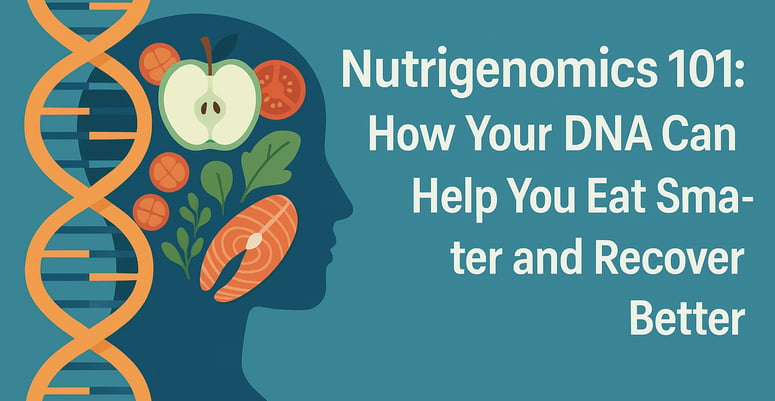Nutrigenomics 101: How Your DNA Can Help You Eat Smarter and Recover Better
Discover how your genetics influence your nutrition and recovery. Learn how nutrigenomics helps you personalize your diet, improve performance, and feel better—plus tools to start today.
5/12/20253 min read


Nutrigenomics: Eating Smarter Based on Your DNA
You ever wonder why your friend can eat pizza three times a week and stay lean while you bloat up after one slice? Or why some people feel great on high-fat diets and others crash hard? It’s not just willpower or metabolism—it might actually come down to your genes.
Welcome to nutrigenomics—the science of how your DNA affects the way your body handles food. And yeah, it’s kind of a game changer.
What Even Is Nutrigenomics?
In simple terms, nutrigenomics looks at how your body responds to different nutrients based on your genetics. Instead of guessing whether carbs are “bad” for you or if you should be taking Vitamin D, you can actually look at your DNA and get real answers.
Let’s say you’ve got a version of the CYP1A2 gene that makes you a slow caffeine metabolizer. That afternoon coffee could actually raise your blood pressure and hurt your heart over time—while someone else with the fast version might get all the energy and none of the downside.
It’s like nutrition with cheat codes.
Real Science, Real Impact
This isn’t woo-woo science—it’s backed. Research in Frontiers in Nutrition showed that people respond differently to food because of genetics. And another study in News Medical explained how this approach could lead to better energy, improved digestion, and even disease prevention.
So if you’ve been doing “all the right things” and not seeing results, it might be time to look at what’s happening under the hood.
GenoPalate DNA Nutrition Test
Amazon Link
Get personalized diet recommendations based on your DNA—know how your body handles carbs, fats, and vitamins in just one test.
How Genes Affect What You Eat
A few gene examples that play a big role in your nutrition:
LCT gene – tells you if your body can handle lactose (milk, cheese, etc.)
MTHFR gene – affects how you process folate, which impacts energy and brain health
FTO gene – linked to fat storage and appetite signals
These tiny genetic switches can explain why your body reacts differently to certain foods—even if they’re technically “healthy.”
Supplements That Actually Work For You
Most people take generic vitamins and hope for the best. But with nutrigenomics, you can find out exactly what you’re actually missing and skip the fluff.
For example, if you’re genetically low in B vitamins, that multivitamin you’re taking might not even scratch the surface.
Rootine Personalized Daily Multivitamin
Amazon Link
Custom-formulated vitamins based on your genetic and lifestyle data. No fillers, just what your body actually needs.
Performance, Prevention, and Feeling Better
Nutrigenomics isn’t just about tracking macros. It’s about:
Knowing which foods give you real energy
Avoiding ingredients that throw your system off
Making smarter choices long-term for your body, not someone else’s
It can help with everything from stubborn weight to brain fog to digestive issues. And if you’re training consistently, it can even fine-tune your diet to support better recovery and performance.
Amazing Grass Greens Blend Superfood
Amazon Link
A nutrient-dense greens powder that combines alkalizing farm-fresh greens with wholesome fruits and veggies, providing a convenient way to boost daily nutrient intake and support digestion
-Stuff to Keep in Mind
Nutrigenomics is real, but it’s still growing. Some genes we understand well, others not so much yet.
You still gotta eat well overall—this just helps you be smarter about it.
Make sure any test you do protects your data. Always check privacy policies.
Final Thoughts
Bottom line? Your diet should work for you—not just because it worked for someone else online.
Nutrigenomics helps take the guesswork out of what you eat. Whether you're trying to feel better, train smarter, or just figure out why your body reacts the way it does, understanding your DNA is a solid place to start.
Pair that insight with the right tools, and you're not just eating healthy—you’re eating right for your body.
FITNESS
Nutrition
WellnesS
info@movebetterco.com
© 2025. All rights reserved | Privacy Policy | Terms & Conditions